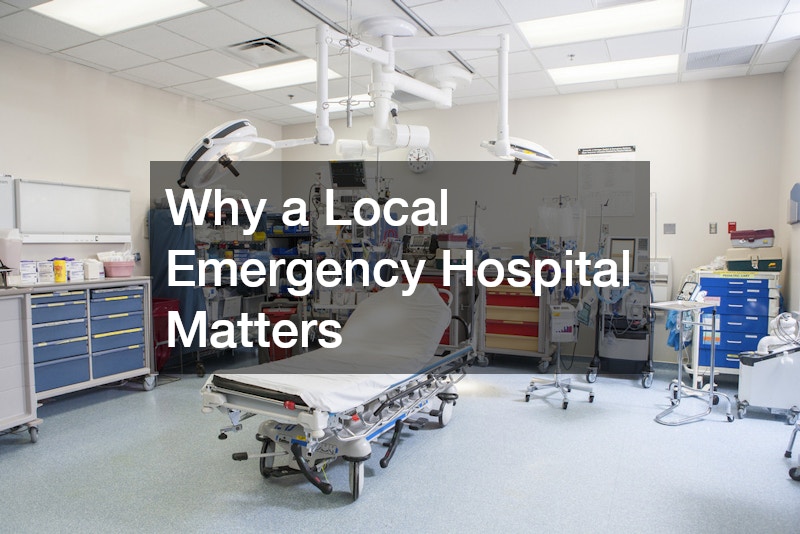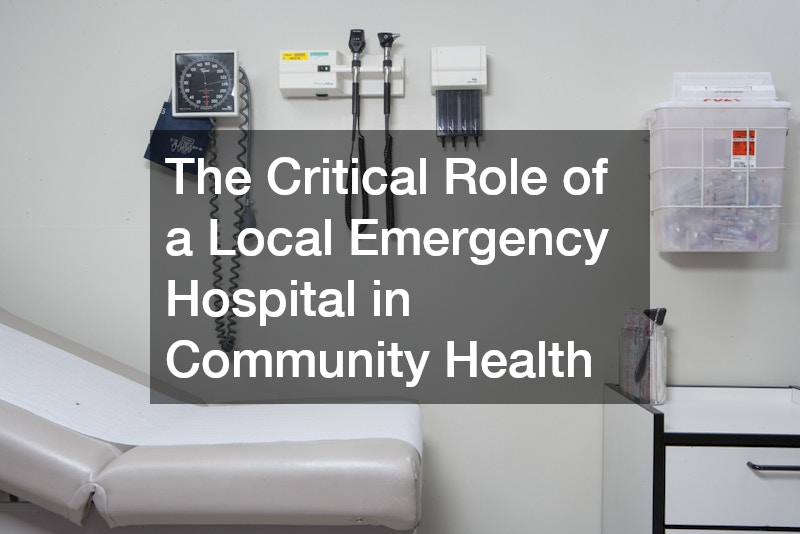
When an unexpected medical emergency strikes, time becomes the most important factor. Whether it is a sudden illness, a severe injury, or an urgent complication, having access to a local emergency hospital can make all the difference. These hospitals are designed to provide immediate, lifesaving care while supporting both patients and families during some of their most difficult moments.
A local emergency hospital is more than just a facility with doctors and nurses—it is a cornerstone of community health. It provides around-the-clock medical services, ensuring that residents have access to urgent care whenever the need arises. Understanding the role these hospitals play helps highlight why they are vital to the overall safety and well-being of the community.
Immediate Access to Care
Emergencies do not happen on a set schedule. They can occur in the middle of the night, during a holiday, or while someone is at work or school. A local emergency hospital is always prepared to receive patients regardless of the time or day. This constant availability provides peace of mind for families, knowing that medical help is never far away.
Quick access to care also improves patient outcomes. In critical conditions such as strokes, heart attacks, or traumatic injuries, every second counts. Having a hospital nearby reduces travel time, which can be lifesaving. The ability to begin treatment quickly can prevent complications, limit long-term effects, and even save lives.
Advanced Technology and Skilled Professionals
Modern emergency hospitals are equipped with advanced medical technology that allows healthcare professionals to diagnose and treat a wide range of urgent conditions. Imaging machines, surgical suites, laboratory services, and monitoring equipment are readily available to support accurate diagnoses and immediate interventions.
Equally important are the healthcare professionals who work within these facilities. Emergency physicians, nurses, and specialists are highly trained to handle urgent and unpredictable cases. Their expertise, combined with rapid response systems, ensures that patients receive the highest level of care from the moment they arrive.
Comprehensive Emergency Services
A local emergency hospital typically offers a wide spectrum of services to address different types of urgent medical needs. These can include:
-
Trauma Care: For serious injuries resulting from accidents, falls, or other incidents.
-
Cardiac Emergencies: Rapid treatment for heart-related issues such as heart attacks or arrhythmias.
-
Neurological Emergencies: Care for strokes, seizures, and other urgent brain or nervous system conditions.
-
Pediatric Emergencies: Specialized care for children experiencing medical crises.
-
Respiratory Emergencies: Treatment for conditions such as severe asthma attacks, pneumonia, or breathing difficulties.
By covering multiple areas of emergency medicine, these hospitals ensure that individuals receive appropriate care tailored to their condition.
Support for Families and Communities
When a loved one is in crisis, the experience can be overwhelming for family members. Local emergency hospitals not only provide medical care but also emotional support. Social workers, counselors, and compassionate staff members are often available to guide families through the process, offering clarity and reassurance.
These hospitals also play a broader role in the community. They may partner with local organizations to provide health education, host blood drives, or offer wellness programs. In doing so, they help foster healthier communities and prepare residents to respond more effectively to emergencies.
Coordination With Other Healthcare Providers
Emergency care is often the first step in a patient’s healthcare journey. Once stabilized, patients may require follow-up treatment, rehabilitation, or long-term management of their condition. Local emergency hospitals frequently coordinate with primary care physicians, specialists, and rehabilitation centers to ensure continuity of care.
This collaboration helps patients transition smoothly from emergency treatment to ongoing medical support, reducing the risk of complications and improving recovery outcomes.
Disaster Preparedness and Response
In addition to treating individual emergencies, local hospitals also play a critical role in disaster preparedness. Whether it is a natural disaster, a community-wide health crisis, or a large-scale accident, emergency hospitals are often the first line of defense. They are equipped to handle surges in patient numbers, provide triage services, and coordinate with local authorities and emergency responders.
This level of preparedness ensures that communities can respond effectively to unexpected large-scale events while maintaining care for everyday emergencies.
Why a Local Emergency Hospital Matters
The presence of a local emergency hospital provides more than convenience—it provides security, stability, and hope. Knowing that specialized care is nearby allows residents to go about their daily lives with confidence. It strengthens the community’s resilience, ensuring that in times of crisis, help is never far away.
Ultimately, these hospitals are about more than medicine. They represent a community’s commitment to protecting its members, offering a lifeline in moments of uncertainty, and delivering compassionate care when it is needed most.
A local emergency hospital serves as a cornerstone of health and safety for any community. From providing immediate access to advanced care, supporting families, and coordinating with broader healthcare systems to preparing for large-scale emergencies, these hospitals are indispensable. They embody readiness, compassion, and expertise, ensuring that when emergencies arise, the community is never alone.
In times of need, the value of a local emergency hospital becomes crystal clear. It is not just a building—it is a beacon of hope, healing, and reassurance for everyone it serves.




